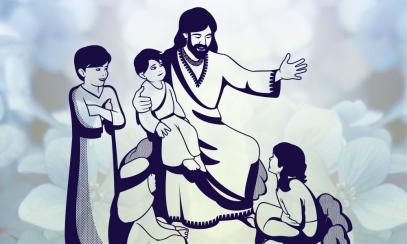
Via Fidelis: The kerygma: God the Father sends us his only-begotten Son
From the vast narrative of divine love, God’s unprecedented response to human brokenness emerges as a profound moment of extraordinary grace. The Christian kerygma, or core Gospel proclamation, reaches its crescendo in the stunning revelation that God the Father does not abandon humanity to its sin. He instead offers redemption through an intimate and costly act — sending his only-begotten Son for our salvation.
From the vast narrative of divine love, God’s unprecedented response to human brokenness emerges as a profound moment of extraordinary grace. The Christian kerygma, or core Gospel proclamation, reaches its crescendo in the stunning revelation that God the Father does not abandon humanity to its sin. He instead offers redemption through an intimate and costly act — sending his only-begotten Son for our salvation.
Over recent months in our Via Fidelis journey, we have explored humanity’s redemptive arc, tracing how divine love persists from creation through our fall, culminating in the ultimate act of salvation. This is not merely a theological concept, but a transformative truth captured beautifully in John’s Gospel: “For God so loved the world that he gave his only Son, so that everyone who believes in him might not perish but might have eternal life” (3:16, New American Bible, Revised Edition).
This well-known line from the Gospels highlights for us that despite human sinfulness, God’s plan for us was always greater than the one we set for ourselves. God desired to restore us to the relationship we had before “the fall” and to bring us into a special eternal relationship with him. This is an intimacy we could never have access to without Christ Jesus.
This mystery of God the Father sending the Son to us is known as the Incarnation, or “taking on flesh” (see Jn 1:14). There are many points that we can derive from the Incarnation, but the one we reflect on now is that Jesus’ Incarnation as man is revelation. In Christ, God takes on human life, speaks human language, acts in human ways and even dies as humans do. Assuming our humanity allows Christ to transform humanity from within.
It is important to emphasize that Christ himself, and everything that he does, is considered to be the fullness of revelation. Therefore, revelation in its truest sense is not a book or a text, but rather a person. That text (Scripture) gives us knowledge of that person. So, what then is revealed to us in the Incarnation and life, death and resurrection of Christ?
First, Christ reveals God to us. We come to know the Lord as both God the Father, and God the Son whom the Father sends. We also come to know the Holy Spirit through the Incarnation and in Jesus’ actions, including the giving of the Holy Spirit to his Church. The “Christ event” — a phrase used to capture the totality of this unique entrance of God into human history — reveals to us that God is Trinitarian. Human relationality and our longing to belong all make greater sense because we now know that God is communal. It is also for this reason that the salvation of eternal life is best understood as a relationship of communion.
This brings us to another divine characteristic that Jesus reveals to us: the depth of God’s love. We already encounter his love in the act of creation and in his willingness to remain in relation with fallen humanity. Then Jesus reveals the extent to which God’s saving will extends. God is willing to enter our reality to change it. As his death on the cross displays, he embraces all that that our reality entails.
Not only does Jesus reveal God to us, but by taking on all that it means to be human (except sin), Jesus reveals what it means to be truly human. True human fulfillment is only accomplished by the complete self-giving love that Christ exemplifies in the Incarnation and on the cross, and in every action he takes throughout his life.
Jesus’ actions of love, healing and goodness are models for us; his teachings are the wisdom that must ground our lives. Everything about the Incarnation is revelatory. God, God’s saving will, and our humanity all come together as Jesus transforms humanity through death and resurrection.
Michael Martocchio, Ph.D., is the secretary of discipleship and the director of the Office of Catechesis and Christian Initiation. Email him at mmartocchio@charlestondiocese.org.



